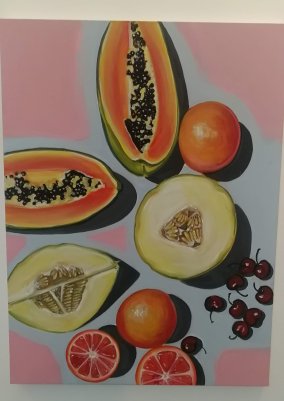Output Open 4, OUTPUT, until 23rd February, free
In a way, I’ve been questioning what the point of writing this actually is. Open submission shows are by their very nature disjointed – perhaps not incoherent, but usually lacking in narrative. This is absolutely fine because it’s often an inevitable part of their purpose. When artists are simply asked to submit work of their own choice, with no theme set, there’s no reason why a cohesive view should be expected.

I’ve covered New Contemporaries in the past because of the specific conditions of NC wanting to be seen as the group to show a “vision of the future”. Thus a visit to the show is not a review of the individual artists, but a comment on the concept – a distinction I hope I’ve got better at making over time. In the process I feel that my purpose is not really to review individual artists. I might comment on how they fit into an overall picture of themes which emerge, but to say much more on the basis of (often) a single piece of art feels unfair.
So I’ll talk first about the ‘specific conditions’ which could be said to apply at OUTPUT. The gallery’s remit of showcasing work originating in Merseyside is now established, and I’ve long been a fan of they way they’ve executed it. This is the fourth Open they’ve organised, and they’re never big shows. This is good: it means that there’s space for each artist’s work to be heard. Some may argue that standing out in a big show is a greater pointer of talent; I say that actually running a show where artists can show more than one artwork to give the audience a greater sense of who they actually are is better.
This also means that I’m better able to talk about the individual artists, having had my interests piqued by more of an oeuvre. And there’s a couple of things here I’d like to talk about in particular.

Whilst there’s lots of strength in here – certainly nothing I hate – allow me to indulge and focus on the two artists who’s work particularly stands out to me. The first is Mia Cathcart: I LOVE her paintings here. Her use of fruits is suggestive in a way that feels like an update of art history than smutty suggestion. It’s sensual and enticing, but also makes me feel very aware of my place as a viewer and that in turn raises all sorts of questions about who I am, who these people are. Imagining suggested relationships, or lack of – or who knows. Is it about me or the image? What a lot to pack into a painting of some fruit – I’m sold.
The second is Faisal Koukash’s series (featured image). Part of their appeal lies in their execution: buildings, mostly, constructed from simple shapes in strong colours – I like the palette and I like the deceptively simple painterly execution. But I also like the hanging very much indeed, which orders what you need to feel. At eye level the scene is set: facts about Palestine transcribed directly from Wikipedia, a wall and a sky rendered – surely uncoincidentally – in red and orange. From this starting point your eye can then wander to the rest of the images which create a sense of place. There’s strength in this sense of multiplicity, creating a reality more tangible than Wikipedia could.
Last year I didn’t write about many OUTPUT exhibitions, mostly because they were really short. This meant I either missed them if I couldn’t go one particular weekend, or they wouldn’t be on for you to go and see by the time I could write about them. Happily this year the programme looks like it’ll give a little longer for each exhibition, so there’s more time for more visitors. An open is a decent way to start (and they’ll have one to conclude the year, too) – it sets out a feel for the mood the gallery are interested in. And it’s a good one: skilled, political, multidisciplinary (someone who knows more about comics than me should write about Cath & Sarah Garvey’s earning their place here). If I wasn’t already looking forward to several of the exhibitions they’ve programmed for 2020, this show would sell me on coming back for more discoveries.
